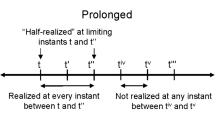Abstract
Of all the important ideas those o£ being and of time seem to have been muddled throughout their history. And of the two, the second seems always to have won the confusion derby. Much of the time muddles come from conceiving of time as something that flows, i. e. from identifying flux and time rather than construing time as the step of becoming. That reification of time, so typical of ordinary knowledge, comes down from archaic thought — and this not only in the Orient and in the Mediterranean. Thus the Mayas, who created a dynamical world view, believed that the gods carried both the sun and time on their backs, and they designated time, the sun and the day, with the same word, namely kinh (León-Portilla [8]). The conceptions of time as thing and as process are of course found in a number of locutions in the Indo-European languages, suggesting that time flows, flees and even fleeces us; that it can be lost and found, stolen and gained; that it is ever in a hurry to pass from past to future; that it can cause birth and death. And, at least in Spanish, time can also be killed and must even be given time (Hay que dar tiempo al tiempo).
Access this chapter
Tax calculation will be finalised at checkout
Purchases are for personal use only
Preview
Unable to display preview. Download preview PDF.
Similar content being viewed by others
References
Bergmann, P., Leibowitz, J. L.: New Approach to Nonequilibrium Processes. Phys. Rev. 99 (1955) 578–587.
Blatt, J. M.: An Alternative Approach to the Ergodic Problem. Progr. Theor. Phys. 22 (1959) 745–756.
Bunge, M.: Physical time: the objective and relational theory. Phil. Sci. 35 (1968) 355–388.
Bunge, M.: Physique et métaphysique du temps. Proc. XIVth Intern. Congress of Philosophy, I. Wien: Herder 1968.
Bunge, M.: Foundations of Physics. Berlin-Heidelberg-New York: Springer 1967.
Gold, T.: The arrow of time. Am. J. Phys. 30 (1962) 403–410.
Grad, H.: Levels of description in statistical mechanics and thermodynamics. In: M. Bunge (Ed.), Delaware Seminar in the Foundations of Physics. Berlin-Heidelberg-New York: Springer 1967.
León-Portilla, M.: Tiempoy realidad en el pensamiento maya. México: Universidad Nacional Autónoma de México 1968.
Noll, W.: Space-time structures in classical mechanics. In: M. Bunge (Ed.), Delaware Seminar in the Foundations of Physics. Berlin-Heidelberg-New York: Springer 1967.
Prigogine, I.: Introduction to Thermodynamics of Irreversible Processes, p. 14. New York: Interscience 1961.
Russell, B.: Our Knowledge of the External World. London: Allen & Unwin 1952.
Truesdell, C: The Elements of Continuum Mechanics. Berlin-Heidelberg-New York: Springer 1967.
Whitehead, A. N.: The Principles of Natural Knowledge. Cambridge: Cambridge University Press 1919.
Author information
Authors and Affiliations
Editor information
Editors and Affiliations
Rights and permissions
Copyright information
© 1972 Springer-Verlag, Berlin · Heidelberg
About this chapter
Cite this chapter
Bunge, M. (1972). Time Asymmetry, Time Reversal, and Irreversibility. In: Fraser, J.T., Haber, F.C., Müller, G.H. (eds) The Study of Time. Springer, Berlin, Heidelberg. https://doi.org/10.1007/978-3-642-65387-2_8
Download citation
DOI: https://doi.org/10.1007/978-3-642-65387-2_8
Publisher Name: Springer, Berlin, Heidelberg
Print ISBN: 978-3-642-65389-6
Online ISBN: 978-3-642-65387-2
eBook Packages: Springer Book Archive



